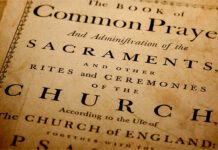In Part 1 of this blog series, we said that in order to answer the question of “who the Church is”, we needed to first ask who Jesus is, and then ask what His salvation is. I walked through two examples of how we tend to answer the series of questions– Who is Jesus? What is Salvation? Who is Church? What is Mission?– and then offered an alternate set of answers from what I observe in the Book of Acts.
All this is foundational. But it is a paradigm shift. Most of us are not used to seeing Church as anything but individuals united by a common purpose– reaching the lost (fill in the word of choice: evangelism, discipleship, mission). BUT…
Church is not a collective of individuals but a community — one family, one body, made of diverse parts who are not members together of an organization but who are members of one another.
Church is united not by a common purpose but by a common identity: we have been marked as the people of God, drawn into the life and fellowship of Father, Son, and Holy Spirit. We are, as my pastor is fond of saying, sons and daughters, not slaves and orphans, or even God’s task force or missional operatives. The New Testament’s favorite image for the Church is a household: a family.
So, what does all this mean for our gatherings, our worship services? Who is Church for?
In one sense, the Church is in the world for the world. We are blessed, broken and given for the life of the world, because we are in Jesus and He was blessed, broken and given for the world. More than that, we are in the world as a sign in the world: we are, as I mentioned in part 1, an alternate society of sorts, showing the world that a new King is now on the throne and this is what it looks like to live under His reign. In this large sense, the Church as the people of God are in the world for the sake of the world and to be a sign of God’s Kingdom in the middle of the world.
But what about the gathered Church, not the scattered Church living out in the world?
Some say it is to reach people, to go “wide” on Sundays and then “deep” on Wednesdays or in small groups. But while that addresses the need for the Church to be both deep and wide, I think it is still answering the wrong question.
The question that not many today are asking is why the Church gathers at all? If we fail to undestand this, we will treat Sundays in a utilitarian way: do the most good for the greatest number of people. So, if a movie series does the trick, go for it. Or if launching a series on sex on Easter is the way to draw them in, by all means go ahead. Or if rock and roll is what the kids are into, ditch the choir and the organ and let ’em have it. The missional movement, I fear, is a reaction to this so-called “attractional” method. No, they say, if you want to reach people, go to them.
There is merit to both approaches and yet both the missional and the attractional seem to me to be built on the same faulty premise: the Church is here to reach people!
But what if the Church is not first about reaching people but about BECOMING a People? Certainly part of the identity involves being sent into the world to “bear witness in word and deed that Jesus is King.” And certainly that witness looks like serving our city and eating and drinking with people in their homes and inviting them into our homes. But all that flows out of an identity.
You know what the Church has said about the reason it gathers? From the early Fathers to the Reformers, you’d be hard-pressed to arrive at a different conclusion than this:
The Church gathers in worship to be formed as the people of God.
We gather in worship. To center on Christ. To be drawn into the communion of Father, Son and Holy Spirit. To hear the Scripture proclaimed. To receive the Sacraments, particularly the Eucharist.
As we worship, we are formed as the people of God. The table is where families find their identity. At the Lord’s Table, we find our shared, communal, familial identity as the People of God. We are one not because of shared interests or personalities or income levels; we are one because Christ has made us so. Gathering in worship at the Table reminds us of that. No, more than that: it forms us as that People.
This discovery of how the Church talked about itself long before church growth experts showed up in America has messed me up in good way. I can’t think about Sundays the way I used to. It’s not just that I can’t let the “end justify the means”; it’s that I have begun to see a different end: not reaching people butbecoming a People.
You see, for decades church leaders have told us that how we worship–what we do when we gather– is just an expression of our faith, so adjust it according to the people you want to “reach.” But for centuries, the Church Fathers have told us that how we worship actually shapes our faith, so choose wisely. I wrote about the difference between those two approaches and the consequences they have on our faith, not only as individuals but as the community of believers worldwide.











